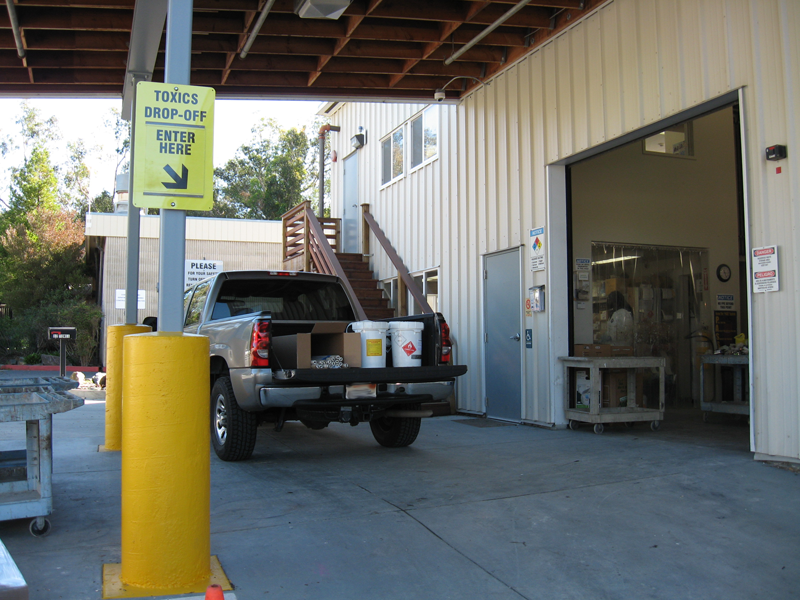Very Small Quantity Generator Program
Very Small Quantity Generator (VSQG) Program
Some entities generate very little hazardous waste and may be eligible to participate in the Very Small Quantity Generator (VSQG) Program. The Program is designed to provide an inexpensive hazardous waste disposal option to businesses, schools, non-profits, and other entities.
The Program operates by appointment only.
Are you a VSQG?
A VSQG is any business that generates less than 100 kilograms (about 220 pounds or 27 gallons) of hazardous waste per month. Typical VSQG businesses include painters, contractors, property managers, autobody shops, dry cleaners, schools, small laboratories, and many others.
Some businesses do not generate waste on a regular basis, but do have paint, fluorescent lights, or other wastes lying around. So, even if you want to “clean up” the office, you may generate small amounts of hazardous waste. Such businesses are also considered a VSQG.
Who May Participate?
Only qualifying VSQG businesses operating within San Mateo County may participate in VSQG collection events. Businesses that generate greater than 27 gallons or 220 pounds of hazardous waste per month cannot participate. If you fall into this group, contact an inspector in the Hazardous Materials Program (CUPA) at (650) 372-6200 or see other options below.
If you only have paint to recycle, please visit paintcare.org/vsqg and paintcare.org/contractors to find a drop-off site near you to recycle your leftover and unwanted paint.
If you only generate universal waste such as fluorescent lamps and batteries, another option is to contact a recycler. Please visit smchealth.org/universalwaste for recycling options.
Don’t Qualify as a VSQG?
If your business generates more than 100 kilograms (27 gallons or 220 pounds) of hazardous waste, please find a certified hauler to properly dispose of your waste:
Commercial hauler information is found on our hazardous waste hauler list or the Department of Toxic Substance Control’s registered hazardous waste transporter database at hwts.dtsc.ca.gov/transporters/. Businesses that generate electronic waste, PV modules, appliances, or large quantities of universal waste can find a universal waste hauler at smchealth.org/universalwaste.
Accepted Wastes and Costs
Wastes accepted and associated costs are listed in the VSQG Fee Schedule. Please note the container size of the waste must be less than 5 gallons total. The base appointment fee is $25. In addition to the appointment fee, the cost of disposal are prorated by the type and amount of waste you have (on a per unit basis).
The Program is designed to provide an inexpensive disposal option for entities generating less than 100 kilograms (about 220 pounds or 27 gallons) of hazardous waste per month.
Not Accepted Wastes
Waste in a container that is larger than 5 gallons in size, maximum, is not accepted. The following list of wastes that are not accepted by the program:
- Radioactive Wastes
- Electronic Wastes and Appliances
- Compressed Gas Cylinders (except propane)
- Explosives and Ammunition
- Medical/Biological Wastes
- Sharps and Needles
- Tires
- Asbestos
- Pressure Treated Wood
Legal Requirements
If your business qualifies as a VSQG, certain legal requirements will apply to your business, including hazardous waste storage amounts, transportation limits, and State EPA Identification numbers. Please contact an inspector in the Hazardous Materials Program (CUPA) at (650) 372-6200 for these and other legal requirements.
Contact Information
If you have any questions or need further information, please call (650) 464-6734 or email cgleaves@smcgov.org.
Request a VSQG Appointment
Very Small Quantity Generators (VSQG) collections are held at our San Mateo facility on the first and third Wednesday of each month by appointment only. Appointments are available between 9:00 a.m. and 1:00 p.m.
To request an appointment:
1. Determine if your business qualifies as a VSQG by only generating less than 100 kilograms (about 220 pounds or 27 gallons) of hazardous waste per month.
